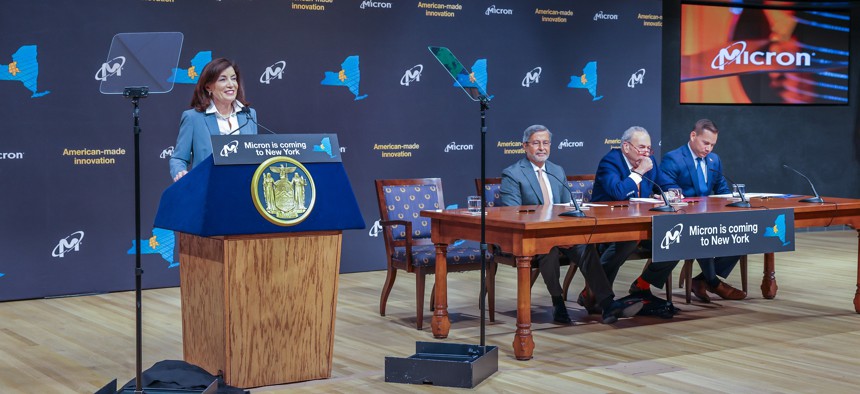Chip Maker Commits Up to $100B for U.S. Manufacturing Site

Oct. 04, 2022 -- Syracuse, N.Y. -- Gov. Kathy Hochul, Sen. Chuck Schumer, Onondaga County Executive Ryan McMahon and Micron CEO Sanjay Mehrotra announce $100 billion private investment in mega-complex of computer chip plants in Central New York. Mike Groll/ Office of Governor Kathy Hochul
The facility is planned for upstate New York. It would mark one of the first major new investments by semiconductor companies following the passage of billions in federal incentives.
New York state landed a commitment from a leading semiconductor maker to build a $100 billion manufacturing facility near Syracuse, a major coup for the state and one of the first projects enabled by new federal incentives for producing computer chips in the United States.
Micron, a chip maker based in Boise, Idaho, announced plans Tuesday to build the vast complex in the town of Clay. Over 20 years, the company plans to construct a “clean room,” the dust-free environment needed to produce computer chips, the size of nearly 40 football fields. Micron says it would be the largest such facility in the country.
Gov. Kathy Hochul, a Democrat up for election next month, said the development “marks the start of something transformative in scale and possibility for our state’s economic future.”
U.S. Senate Majority Leader Chuck Schumer, a New York Democrat, also hailed the news.
“This project is a dramatic turning point for a region that has faced decades of lost manufacturing jobs,” he said in a press release. “Micron’s investment will make New York’s semiconductor corridor into a major engine powering our economy and will supply ‘Made in New York’ microchips to everything from electric vehicles, 5G and defense technology to personal computers and smartphones.”
The announcement comes as states jockey with each other to secure a new wave of manufacturing facilities associated with the transition to electric vehicles, protectionist trade policies and new federal subsidies for domestic tech manufacturing.
Intel, for example, announced in January that it would spend $20 billion to build two new chip factories near Columbus, Ohio.
Many states have also offered massive tax breaks and other incentives to attract electric vehicle factories and battery manufacturing plants.
As automakers incorporate more electronics into their cars, they have become more dependent on chip manufacturers, too. Many slashed orders for the high-tech parts when the pandemic struck in early 2020, a move that came back to haunt them as demand for new vehicles shot up in the following months. The automakers couldn’t keep up because they were waiting for chips manufactured overseas.
President Biden has pushed to increase high-tech manufacturing in the United States, including with the passage this summer of a package that includes billions of dollars in incentives for computer chip makers.
The president praised Micron Tuesday for its plans in New York. “To those who doubted that America could dominate the industries of the future, I say this – you should never bet against the American people,” Biden said in a statement. “Today is another win for America, and another massive new investment in America spurred by my economic plan.”
Micron credited federal, state and local incentives for persuading it to build the factories in upstate New York.
Empire State Development, a state entity, offered Micron up to $5.5 billion in incentives if the company meets certain hiring and environmental goals. The state incentives were authorized through legislation Hochul signed in August, known as the “Green CHIPS” law. It allows semiconductor manufacturers to obtain state tax credits of up to 7.5% of salaries and wages, 5% of project capital expenditures, and 8% of research and development costs.
New York state is also providing $200 million to improve roads and other infrastructure near the new Micron campus, along with other perks. Onondaga County agreed to make water upgrades, fund a research center with Syracuse University and provide workforce development grants.
The development also relies on sweeteners Congress approved as part of the $54.2 billion CHIPs and Science Act of 2022. The law includes $39.4 billion in subsidies to encourage companies to manufacture chips domestically.
Micron executives attended the White House signing of the CHIPS Act and immediately promised that the company would spend $40 billion on chip manufacturing in the U.S. as a result of the new law.
The state and federal incentives require Micron to abide by certain environmental and workforce standards. The new factories, for example, will use power that’s entirely from renewable sources, and its buildings will meet at least LEED Gold standards.
The builders will use a project labor agreement when constructing the plants and pay at least federal prevailing wages. The company plans to spend 30% of its construction budget on work from economically disadvantaged people and businesses owned by women, minorities or disabled veterans.
Micron’s announcement caps a long saga for local officials in Clay, who first designated the factory site for chip development in 1999.
Daniel C. Vock is a senior reporter for Route Fifty based in Washington, D.C.
NEXT STORY: Mental Health Crisis Teams Aren’t Just for Cities Anymore






